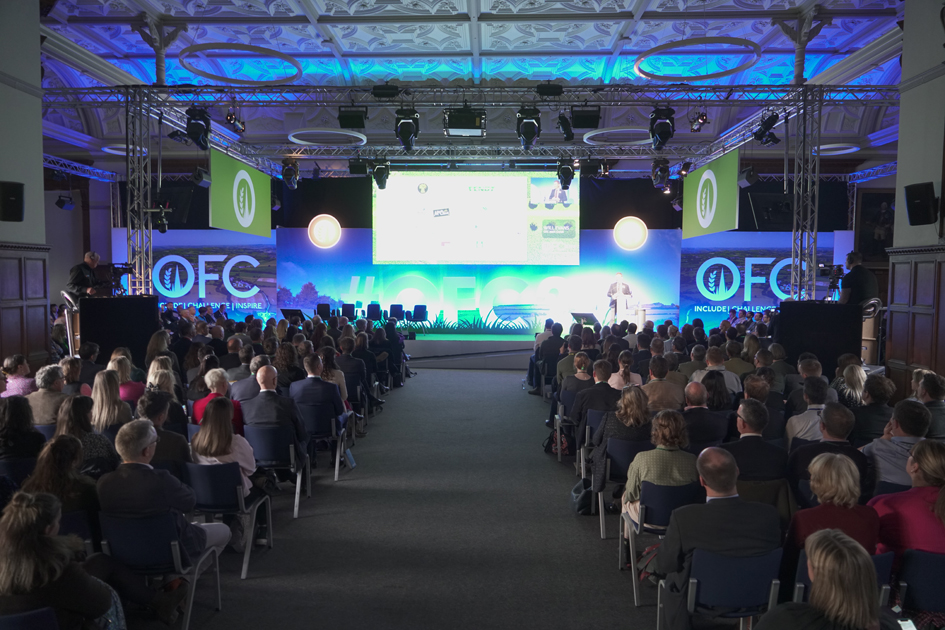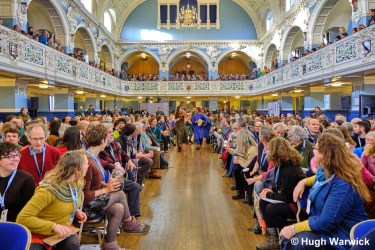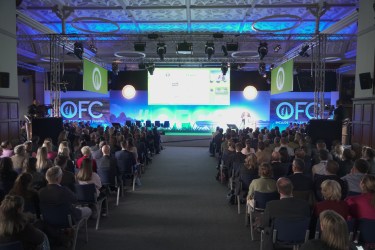The 2024 edition of the Oxford Farming Conference (OFC) took place on 3rd-4th January. Our Senior Sustainability Consultant Luke Briggs was on hand. Here are his thoughts on the main themes of this year’s event, and their implications for farming.
1. Farmers are increasingly at the sharp end of supply chain risk
The tone for OFC 2024 was set by its headline report, which asked Can broken food supply chains be fixed? Throughout the conference representatives reported a growing realisation throughout the supply chain: farmers are taking on a disproportionate risk compared with the rewards on offer.
This was exemplified by panellist Robert Chapman, Managing Director of Farmlay. He described the egg shortages of 2023 and showed how producers responded by dropping production in the face of endless squeezing from supermarket buyers. The take-home from this is that if farmers can’t make a fair return from their endeavours, they will withdraw from the market.
However, conditions are constantly changing. For example, world events such as COVID and geopolitical disruptions, are bringing the issue of food security into focus. This should prompt better appreciation of UK farmers, and hopefully will result in the setting of self-sufficiency targets.
In general though, fixing food supply chains is challenging. The report suggests retailers should bear more risk through long-term contracts with producers. Without this, more farmers may exit production due to low reinvestment confidence, potentially tarnishing the UK’s high production standards.
2. Diversity leads the way
In showcasing ‘The Power of Diversity’ as this year’s Conference theme, farmer and OFC Chair Will Evans is helping to bring awareness to an industry that has historically struggled with equal representation. The Conference did well to tackle some challenging themes and provided an excellent platform for some to voice their own challenges within the sector, and rightly highlight that diversity can’t be maintained without inclusivity. This left a sense of hope for change and for the visible face of agriculture to reflect the growing diversity within modern farming businesses.
The theme of diversity largely focussed on greater representation across nationality, age, sex, class, race, and neurodiversity, yet also encompassed diversity in farming practices and sectors. This was well captured by the energetic and insightful presentation by Dr Awal Fuseini, who gripped the conference with his insight into the UK Halal market and the huge associated opportunities within the sector.
There are still great strides required to move from the ‘male, stale and pale’ image of the conference, and the wider agricultural sector, yet the rewards for achieving this shift will arm the industry with the diversity of approach required to tackle its most pressing issues.
3. Regen continues its surge into conventional agriculture
Regenerative agriculture is likely to be the one theme that helps to drive the convergence of OFC and another meeting that was once seen as a very different beast, namely the Oxford Real Farming Conference (ORFC).
The appearance of Andy Cato, farmer and co-founder of Wildfarmed, perhaps reflects this best. He is now a prominent name in the regenerative agricultural movement. Meanwhile his company is a leading force in bringing regenerative practices to mainstream markets – a dream that seemed far-fetched a decade ago. Having said this, the remainder of the main conference was relatively light on regen content.
In contrast, the satellite events hosted by a plethora of NGOs, banks and businesses largely centred around regenerative agriculture. These talks provided deep insights into the practical application of regenerative principles and picked through the need to reframe and prioritise profitability ahead of productivity.
The WWF and Natwest session set out the details of its report, A Roadmap for Financing a Regenerative Agricultural Transition in England. This calls for the government to harmonise policy decisions across food, climate and nature, which can be delivered through regenerative agriculture. This detailed plan provides a refreshing antidote to the approach that some multicorporates adopt, using the “regenerative” tag with little integrity, investment or understanding.
However, it will require a lot more collaboration across the food supply chain to prevent the farmer facing the regen-transition alone. Although not a silver-bullet (which probably doesn’t exist anyway) it will be crucial to establish sufficient funding opportunities and robust communication channels. These will support farmers to develop and implement solutions to produce bountiful nutrient-dense food whilst meeting the UK’s climate and nature goals.
4. Innovation is key for farm businesses to survive and thrive
As the profitability gap squeezes and environmental commitments grow, farms that can integrate innovations to improve efficiencies within their business are most likely to thrive.
The Waste to Opportunity session presented inspirationally innovative and successful approaches, championed by industry leaders. This included Jim Shanks, of Standhill Farm, near Hawick, who established the Scottish tomato industry overnight in utilising the ‘waste’ heat and CO2 from his dairy farm’s AD plant across a 4-acre glasshouse.
Then came Vincent Doumezial, who provided a fascinating deep dive into seaweed farming and showed us its potentially crucial role in solving some of our biggest planetary crises. Meanwhile, Emma Brown from FareShare pitched for continued government and private funding to continue the excellent food waste scheme, the Surplus with Purpose Fund.
Support is required, both privately and publicly, for innovative farmers to operate against a much more level financial backdrop. The current ‘boom and bust’ cycles make investing in the farm business – and taking the kind of risks to propel us along our net zero pathway – almost impossible.
5. ELMs is evolving, again, but maybe long-term policies will emerge
Defra secretary Steve Barclay appeared at the conference to announce a significant upgrade to the ELMs scheme, bulking out SFI options and payments.
Details have since outlined an average 10% increase in payments for farmers, with around 50 new actions as well as updates to existing actions. Unfortunately, on close inspection, the latest ELMs update still leaves many farmers worse off with the loss of BPS – particularly hill farmers.
However, glimpses are appearing of a future that accepts a more collaborative, less polarised way of working at the political end of the sector. Without it, implementing long-term strategies to tackle both the climate and nature crises will not be possible. The short-termist, populist approach to policy making will not work.
What is clear though, is that without adequate investment, whether from public or private sources (and hopefully a blend of both) initiatives will fail.
And finally… there’s a general election coming
Battle lines are certainly being drawn ahead of 2024’s general election. Senior representatives of the major political parties all made high-profile presentations at OFC. In a short address, described as a “pitch for government” by Farmers Weekly’s Abi Kay, Steve Reed, Shadow Secretary for the Environment, presented the headlines of a new deal for farmers. This included pledges for supporting high-quality local food production and shortening supply chains for public food service provision and food security.
Both Reed and the Liberal Democrats’ agricultural advisor Stuart Roberts agreed on the need to drop political tribalism, for the sake of progress for farmers and the long-term planning of the wider food system and environment.
2024 promises to be an interesting year. Perhaps coherence in policy, and a more collaborative, less adversarial atmosphere between the need to produce and the need to nurture natural resources is emerging. Who knows, maybe OFC and ORFC will one day exist under the same roof!
Promar and sustainability
Promar International is a leading player in the integration of sustainability within the food and agriculture supply chain.
We help clients drive efficiency, profitability and resilience whilst also helping to protect the natural environment, enhance brand values and improve health and ethical well-being of communities.
Our team operates throughout the UK, as well as in Germany.








